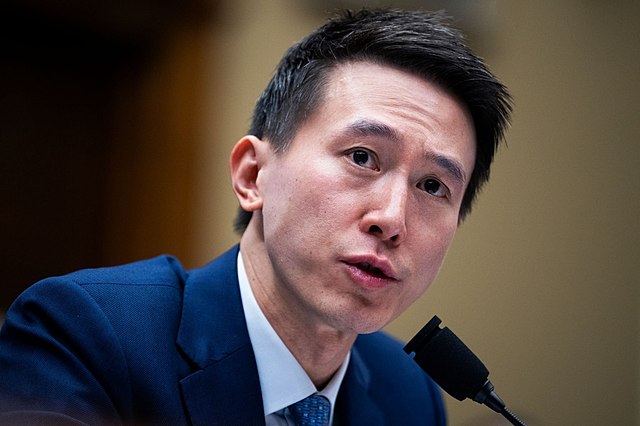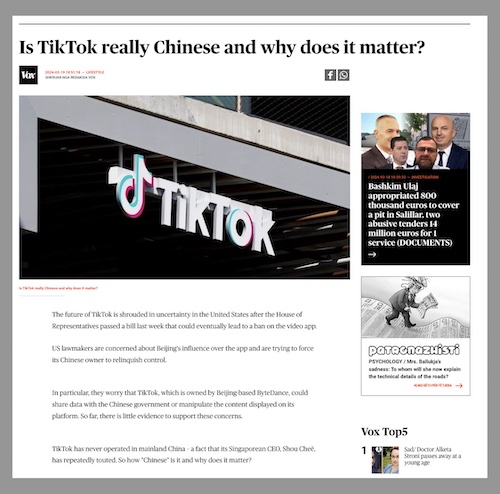
Earlier this month, lawmakers in the United States passed a bill that would mean a nationwide ban of TikTok if ByteDance, its parent company, does not sell its stake within six months. The legislation, which casts the popular social media platform as a threat to national security, now moves on to the US Senate, where its passage is by no means assured — but where support for action against TikTok is coming from strong voices like Virginian democratic Senator Mark Warner.
In much coverage from media in the US and Europe this week, one key question has been the extent to which TikTok is actually Chinese. The company was incorporated in California in 2015, has never operated its app inside China — though its sister app Douyin is popular there — and has a Singaporean CEO. What evidence is there that TikTok is under the thumb of the Chinese leadership?
In one of the most helpful takes this week, professor Li Shaomin of Old Dominion University writes in the Detroit Free Press that the answer to the question of whether ByteDance is an agent of the Chinese state is “complicated.” Li notes that, under the leadership of Xi Jinping, “the entire country is a giant corporation, with the ruling party as its management.” He refers to this as “China Inc.,” a corporatized political structure and politicized corporate structure in which the Party is ultimately on top.

In fact, the implications of this dynamic have already played out quite dramatically in China.
One of the best answers to the question of whether and how ByteDance is beholden to the Chinese leadership came six years ago when its founder and CEO Zhang Yiming (张一鸣) was forced to issue a painfully abject political apology, which at the time we translated in full at CMP.
This stunningly compliant text, direct from the leadership at ByteDance, is one of the best tools available today to break right through the tangled debates about the loyalties and priorities of TikTok’s parent company — and the risks it might pose.
So Sorry, China Inc.
Posted to the WeChat platform on April 11, 2018, Zhang Yiming’s apology was a response to a clearly concerted attack from Chinese media, including the state-run broadcaster CCTV, against Jinri Toutiao, a ByteDance-created content creation and aggregation platform that was accused of lax content controls. The official media attack was followed quickly by a notice from a state content regulator announcing that both Jinri Toutiao and Kuaishou, a live-streaming service, would be subject to “rectification measures.”
But Zhang’s apology was much more than a simple mea culpa to reassure regulators. It fell solidly within China’s dark tradition of the political self-confession, or jiantao (检讨) — an act of submission to those in power.

For anyone reading Zhang’s apology, it should be painfully clear that this was made under extreme political pressure. The CEO, an engineer by background, signals that he will fall into line by ticking off all of the obligatory ideological boxes, just as the most craven of Party cadres would.
“I earnestly apologize to regulatory authorities, and to our users and colleagues,” he begins. “Since receiving the notice yesterday from regulatory authorities, I have been filled with remorse and guilt, entirely unable to sleep.”
In the confessionary text that follows, Zhang locates the root of the problem, tellingly, in his company’s failure to uphold the central political line of the day, the “Four Consciousnesses” (四个意识). This formula demands awareness of four basic tenets that translate into obedience to the Party under Xi’s leadership. They are the need to 1) maintain political integrity, 2) think in big-picture terms (with a mind to political and national security) 3) uphold the leadership core (in other words, Xi Jinping), and 4) keep in alignment with the CCP’s central leadership.
“Since receiving the notice yesterday from regulatory authorities, I have been filled with remorse and guilt, entirely unable to sleep.”
ZHANG YIMING, april 2018 Wechat post
In the same passage, Zhang next identifies the failure at ByteDance to live up to “socialist core values” and the company’s “deviation from public opinion guidance.” This last catchphrase has in fact circumscribed the official policy on media control, and its essential role in maintaining CCP power, ever since the brutal crackdown on pro-democracy demonstrators in China in June 1989.
“All along, we have placed excessive emphasis on the role of technology, and we have not acknowledged that technology must be led by the socialist core value system, broadcasting positive energy, suiting the demands of the era, and respecting common convention,” Zhang writes.
The jarring case of Zhang Yiming’s ByteDance apology, coming just 17 months after the company launched TikTok overseas and years before the app became a concern to lawmakers and governments globally, is one of the clearest illustrations we have of the risks that arise from China’s control-obsessed political system.
No one reading this plea for atonement can entertain seriously the idea that Chinese companies whose products have potentially strategic implications can resist the demands of the government. When push comes to shove, Xi Jinping, as the chairman of China Inc., is the only CEO whose agency matters.




















